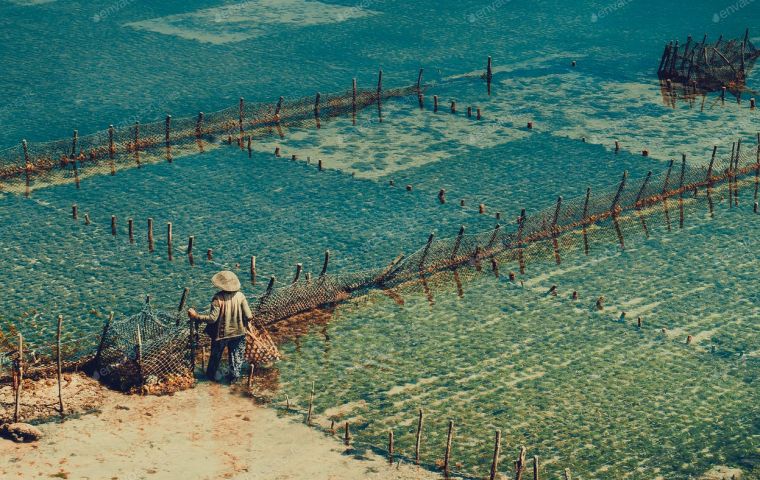MercoPress. South Atlantic News Agency
With Bali beaches empty of tourists, locals are turning to plant seaweed again
 With visitors gone and the economy in tatters, locals are seen carrying baskets laden with seaweed up the shore amid a shift back to former ways of making a living.
With visitors gone and the economy in tatters, locals are seen carrying baskets laden with seaweed up the shore amid a shift back to former ways of making a living. Before the coronavirus pandemic took its grip on Indonesia, the pristine beaches of Lembongan Island lapped by the Indian Ocean were dotted with sunbathing tourists from across the globe.
Now, with many visitors gone and the economy in tatters, locals are often seen carrying baskets laden with seaweed up the shore amid a shift back to former ways of making a living.
Bali normally attracts millions of visitors a year, mostly to beaches in spots like Lembongan, but plans to reopen to foreign tourists have been postponed indefinitely due to climbing COVID-19 cases in Indonesia.
With many restaurants and bars shut on the island, drying seaweed fills the streets as tourism workers return to an industry that died down a decade ago, despite Indonesia's status as the world's second-biggest seaweed producer behind China.
“Farmers are starting to plant seaweed again,” said Boedi Sarkana Julianto of Indonesia's Natural Resources Network (JASUDA), a seaweed farming non-governmental organisation.
Wali Putra, a 50 year-old restaurant manager who has been farming seaweed most of his life, said the pandemic reminded him of his childhood. “Before the tourism boom ... what gave life to the Lembongan people was seaweed,” he said.
Still, seaweed farming is laborious work and less lucrative than tourism, particularly as the pandemic has lowered demand.
Farmers say the dried seaweed, destined for processing and to be exported for use in food, currently fetches around 12,000 rupiah (US$0.80) a kilo, providing an income of up to US$400 a month. That is just over half of what the same haul would have brought before the pandemic, JASUDA’s Boedi estimated.
Puput Astawa, head of the Bali Tourism Board, said visitors were still needed because “agriculture alone could not get Bali's economy back to normal”.
But some locals, like teacher and seaweed farmer Wayan Ujiana, 51, are taking the pandemic as a lesson not to depend too much on tourism: “Don’t forget to diversify your income, so when problems happen we do not collapse.”




Top Comments
Disclaimer & comment rulesCommenting for this story is now closed.
If you have a Facebook account, become a fan and comment on our Facebook Page!